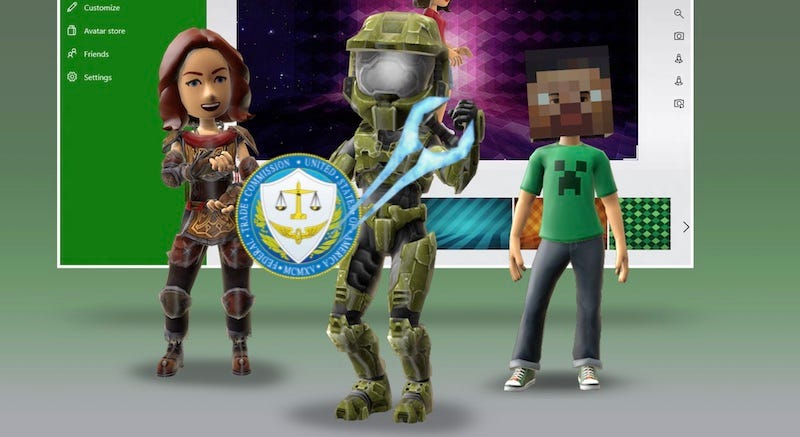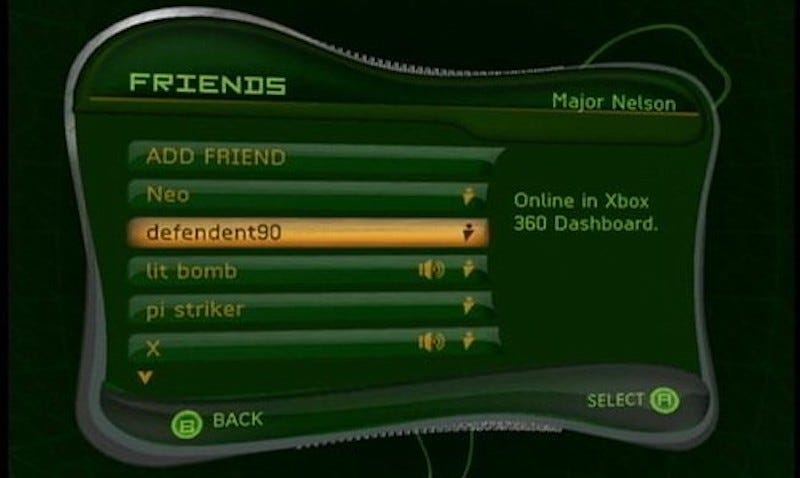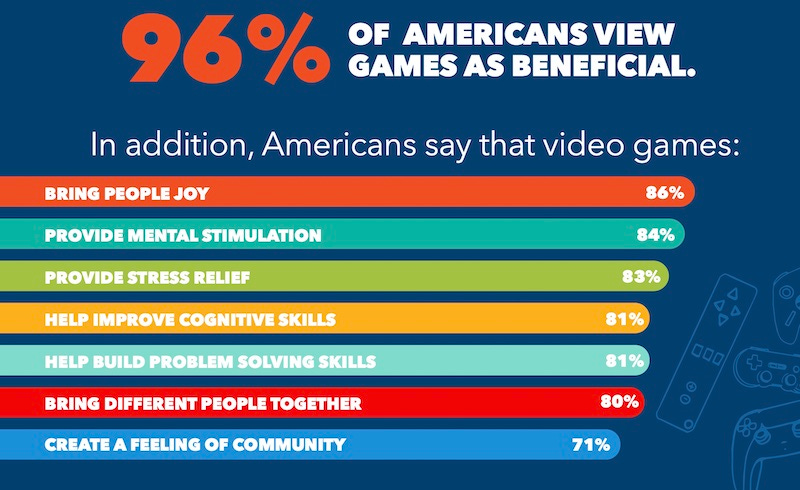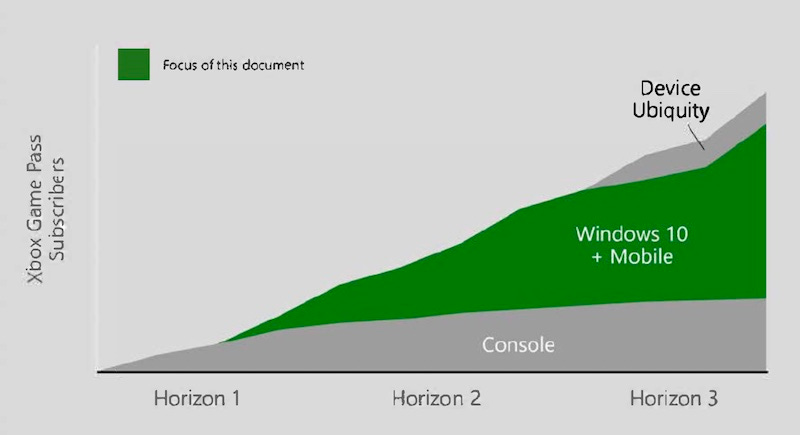Xbox bonanza: that FTC win & the future of Game Pass!
Publikováno: 12.7.2023
It's almost all Xbox, all the time in our final pre-summer newsletter.
[The GameDiscoverCo game discovery newsletter is written by ‘how people find your game’ expert & company founder Simon Carless, and is a regular look at how people discover and buy video games in the 2020s.]
Re-welcome to this mid-week flower of a newsletter, blossoming before your very eyes. What’s up? Well, we’ve got posies, we’ve got daffodils, we’ve got fragrant bouquets of U.S. court rulings, three for a shilling.
Before we start? Here’s our favorite weird video game news from last week. Nier creator Yoko Taro unfortunately lost his Emil mask, which he uses for all public appearances, during Anime Expo. His clutch replacement? A terrifying oversized leprechaun mask. (Oh no - we’re calling shamrocks and shenanigans.)
[Heads up: our GameDiscoverCo Plus paid subscription includes our Friday ‘exclusive’ newsletter, exclusive Discord access, a login to our Steam ‘Hype’ & post-release game performance chart back-end, multiple eBooks & more. We highly recommend it…]
Microsoft vs. the FTC - yes, Microsoft ‘won’, kinda?

Before we veer off into ‘cool Xbox document that nobody else looked at’ territory, it is reasonable of us to concede - yes, Microsoft just beat out the preliminary U.S. FTC injunction against buying Activision Blizzard. Mind you, as CNBC notes:
“The deal isn’t completely in the clear, though. The FTC can now bring the decision to the U.S. Court of Appeals for the 9th Circuit, and the two companies must find a way forward to resolve opposition from the Competition and Markets Authority in the United Kingdom.”
We have no desire to go super deep on ramifications, since many others have in a more timely fashion. This Rebekah Valentine piece for IGN on what happened & what happens next is one of the best ‘explainers’ we’ve seen - go check it.
But what we did want to turn this section into is a brief fan column for North District of California judge Jacqueline Scott Corley, who had to deal with a lot of drama and get to a clean decision in a remarkably short amount of time.
You too can read her full (somewhat redacted) 53-page decision, if you’d like. It’s actually pretty funny in places! Three highlights that we’re still mooning over:
She thinks the FTC is dumb to exclude the Switch from its market definition: one key point that the FTC claims is that only Xbox and PlayStation are comparable devices. Corley notes: “Xbox set the price of its entry-level Series S to compete with Switch”, listing big multiplatform crossovers (Fortnite, Minecraft, Rocket League). If she was “the final decisionmaker” - you can taste the chilliness here - she would include it, but the FTC just needs to make a “tenable showing”. So she waves it through - mainly because it doesn’t affect the final decision.
She breaks down the precise criteria the FTC needs to prove succinctly: in the end, the Federal Trade Commission needs to show all of these: “the combined firm (1) has the ability to withhold Call Of Duty (2) has the incentive to withhold Call of Duty from its rivals (3) competition would probably be substantially lessened as a result of the withholding.” She then proceeds to semi-demolish those claims, using evidence… this starts around Page 33 of the document, if you’d like to read along at home.
There’s not two, but eight reasons why the FTC claims don’t make sense here: these include things like the Activision deal justification within Microsoft including Call Of Duty as multiplatform, no internal documents showing plans to take it Xbox/PC exclusive, and “irreparable reputational harm” to Activision and Microsoft if they did so. The judge sees no evidence of this happening for an “established, multiplayer, multiplatform game with cross-play” like CoD.
There’s also a long, smart section in which Corley disputes the FTC’s expert Professor Robin Lee, who is trying to prove that “the economic benefits of making Call Of Duty exclusive to Xbox outweigh the costs”, but with assumed/notional inputs like ‘20% of affected users on PlayStation would go buy an Xbox’. The judge don’t like that.
But we thought the most interesting section was the following, about Microsoft’s (redacted!) written offer to Sony over Call Of Duty’s future on PlayStation, which Microsoft says is a full 10-year deal. (We can’t see any of the details, unfortunately.)
Anyhow, in the FTC saying that the offer was ‘insufficient’, we see Judge Corley being as close to ‘full blast’ as we’ve seen from a judge’s ruling on this whole thing: “The FTC’s heavy reliance on [Sony’s Jim] Ryan’s testimony is unpersuasive. Sony opposes the merger: its opposition is understandable. Before the merger, Sony paid Activision for exclusive marketing rights that allowed Sony to market Call Of Duty on PlayStation, but restricted Xbox’s ability to do the same.
After the merger, the combined firm presumably will not agree to such restrictions… [and] consumers can utilize the cloud to play on the device of choice, including, it is intended, on the Nintendo Switch. Perhaps bad for Sony. But good for Call Of Duty gamers and future gamers.”
So where are we getting to here? Perhaps that this deal was too complex to block, even if it is a giant ‘big get bigger’ acquisition from a tech giant. And this unraveling is now leading to backlash against the FTC’s Lina Khan, whether justified or not:
“The defeats raise questions about Ms. Khan’s ability to carry out her ambitious goal of reversing decades of weak antitrust enforcement, as political pressure mounts and patience wanes for the 34-year-old academic, who has ruffled the feathers of corporate America.”
Game Pass: boosting adoption beyond the Xbox?
As part of the FTC lawsuit against Microsoft, a massive amount of documents - >1 million - were up for analysis. And though they were pulled down from a public URL, some interesting redacted material appeared after being entered in evidence.
Case in point: this April 2020 internal presentation on “accelerating Xbox Game Pass across devices” [.PDF link] from the Gaming Leadership team at Xbox. This is a rare look at internal MS strategy - albeit before either the Bethesda or Activision deals.
We don’t think anyone else has looked in detail at this document. So we did! Some of the main takeaways we had?
Xbox saw the ‘blue ocean’ of Game Pass outside Xbox: the company noted: “We have been deliberate in how we sequence our expansion across devices, based on opportunity scale and addressability.” They listed 3 expansion horizons: “Horizon 1 (FY20): Console; Horizon 2 (FY21-23): Windows 10 (download & stream) + Mobile (companion & initial xCloud); Horizon 3+ (FY23+): Ubiquitous global access across devices.”
Microsoft knew its PC game strategy hadn’t worked out: the presentation notes: “our initial forays into PC gaming floundered because the services and experiences we delivered created problems for players instead of solving them.” Plans to boost adoption? Better tech, bundling Xbox Game Pass with a newly bought Windows device & adding an “option to install popular gaming applications” during setup.
iOS and Android’s platform fee was screwing up Microsoft’s biz model:“The 30% platform fee charged by both Apple and Google is particularly problematic in gaming, where more than 70% of industry revenues occur after a game is acquired (post-sale monetization, PSM). PSM is a critical component of Xbox Game Pass economics, made more difficult by platform fees.” Hence plans to make a browser-based GP.
There are all kinds of other small but intriguing facts in these type of docs. For example: “Gamers with [on-platform] friends are ~40% more likely to join multiplayer games than single-player games, based on Xbox data on Live users playing Fortnite and Assassin's Creed. Odyssey in the first 10 months after release.”
But overall, what’s fascinating about this document from 2020 is that it both identified and failed to solve a big issue for Game Pass: “We conclude that console remains a viable growth vector for the next 2-3 years, but also, that growing beyond console remains an imperative to achieve our long-term subscriber aspirations.”
While Xbox’s Phil Spencer has repeatedly said that “PC Game Pass is growing at a very, very fast rate for us”, you can see from the above graph that the aspirations for Windows & mobile Game Pass subscribers were big. Microsoft was seemingly hoping for that market to be 2x or 3x that of the ‘Xbox only’ GP subscribers, by 2023 or later.
But we’d guess wildly that right now Game Pass subscribers playing on PC are more like 10% (?) of the total or less, with mobile-only subs never really getting going.
Why hasn’t (non-Xbox) Game Pass scaled fast?

Why would that be? One big, big reason that we think is underdiscussed is the way that both Xbox Game Pass and PlayStation Plus evolved from a ‘pay for multiplayer access’ fee on console. As this handy historical article explains:
“Xbox Live launched in November 2002. Servers for the two launch titles, MechAssault and Unreal Championship, were flooded with eager fans… At the time, Xbox Live was powered by five data centers located in London, Seattle, Tokyo, Redmond, and Tukwila.”
So when players on these consoles have a history of paying $5/month for multiplayer access, gradually morphing the service by adding new features - a couple of free games per month, then a whole catalog of games, is a classic ‘subscription feature creep’ expansion plan. And one that people do like! (See: Amazon Prime’s similar tactics.)
But PC Game Pass is pitching $10-$15/month subs outta ‘nowhere’ to PC gamers who not only a) have never had to pay for multiplayer servers, but b) are used to well-entrenched platforms like Steam doing a good job of implying ‘lifetime ownership’ of games, and c) are a bit suspicious of ‘renting’ PC games. So it’s been a slog.
For those PC gamers, constancy means something in this space. In fact, we just found this 2014 quote from Valve co-founder Gabe Newell: “We've… been around for a while, and I haven't pissed [gamers] off too much. Which they're grateful for because a lot of their relationships, or things that they're fans of, failed them at some point or another. We seem to be kind of reliable and trustworthy, and they like that.”
Will PC Game Pass continue to be a tricky thing to scale? It depends what games Microsoft signs, and how they can build trust. For example, we estimate a game like Total War: Warhammer III has more than 2 million Steam players, and just over 500,000 players on the PC Game Pass service. So - PCGP’s not fully scaled just yet.
If we start to see those numbers equalize, or even see PCGP exceed Steam downloads over time? We’ll know that Microsoft’s radiation of ‘reliability’ - as Valve has done for so long - is working.
In the mean time, the (possible!) Activision acquisition gives Microsoft a lot of revenue generating non-Game Pass assets to play with on both PC and mobile. Diablo IV! World Of Warcraft! Battle.net! Candy Crush Saga! We’ll say it again: the diversification of Xbox’s interests in the space will be an amazing risk mitigator.
Finally, we were amused to see this quote in MS’ Game Pass doc preamble: “Games… are often bound to certain device categories, a byproduct of legacy relationships and technical limitations. The multidevice success of Minecraft and Fortnite illustrate the latent demand for more fluid access to games.” So, note to the FTC: this attitude isn’t just a ‘front’, huh?
The game discovery news round-up..

Finishing off our newsletter with aplomb, here’s the most notable things we spotted from around the game discovery & platform world since Monday:
Late-breaking news: Roblox is coming to the Meta Quest, “with an Open Beta on App Lab releasing in the coming weeks.” It won’t be on the full store yet, and “the Open Beta will only support Meta Quest 2 and Meta Quest Pro devices”, but maybe this is the metaverse that will really scale on the Quest platform?
Steam has revealed that 11.4 million players downloaded demos during June’s Next Fest, “the most visitors of any Next Fest ever”, adding a page listing the Top 50 demos by unique player, headed by House Flipper 2, Lies Of P & Viewfinder.
How well-staffed are the biggest games? According to credits data from Mobygames, “9,166 people were credited in the making of Diablo IV, a new record!”, including 2,464 audio-related credits (voice acting ftw!), 902 people with Art/Graphics roles, 397 in QA, 394 in Programming & 193 in Design.
How’s the Fortnite Creative 2.0 scene coming? eSports brand (and now also developer!) 100 Thieves just rolled out Bank Heist, while explaining to Dexerto it’s a baby step for now: “This is the first of many games. This is very early in the UEFN platform.” The map looks good, but yep, modding is still relatively limited.
In ‘activist FTC gonna activist’ news, the U.S. gov agency recently updated its ‘endorsement guides’ - formerly quite focused around paid ads masquerading as organic endorsements - to add “procuring, suppressing, boosting, organizing, publishing, upvoting, downvoting, or editing consumer reviews so as to distort what consumers think of a product.” (Steam review cheaters, beware!)
The latest PlayStation Plus Game Catalog additions for July just got rolled out, and it’s a good set of catalog games - It Takes Two, Sniper Elite 5, Undertale, and My Little Pony/Spongebob-licensed titles, plus the PS1 versions of Twisted Metal 1 & 2 appearing for PlayStation Premium, ahead of the new TV series roll-out.
Will there be a partial pivot to more retention-heavy games from Netflix, much like Apple Arcade did a coupla years back? MobileGamer.biz looked at recent hires to suggest there’s a “social games push incoming” after a number of “big-name live service and triple-A hires.”
What’s up with Japanese game platform tastes? CyberConnect 2 CEO Hiroshi Matsuyama, aka Piroshi, recently Tweeted that 80% of the folks he met at a Japanese college were using Steam to play games. And Steam’s at a record high for percentage of Japanese users. (But his trip to an elementary school last summer? “Switch=80%; PS4&5=10%; Xbox=0%; Steam=5%.”)
The ESA came out with its 2023 ‘Essential Facts’ presentation on Monday, trying to feel-good the press with stats like 65% of Americans (212.6 million) playing games at least an hour per week, 75% of those play for >4 hours, and gamers average 12.8 hours per week across all platforms. (Also: people like games - above!)
The latest video game VC funding, according to Konvoy, was $472 million in Q2 of 2023 (with 85 deals). Oh yes, and: “Funding by year - 2019: $2.4b; 2020: $2.7b; 2021: $8.8b; 2022: $5.3b; 2023 YTD: $1.2b.” As they say, things are “returning to pre-2021 levels of gaming VC funding” after “over-investment in web3”.
Microlinks: Xbox just added a way you can ‘voice clip’ and report abusive in-game voice chats - great feature; Kickstarter is backing away from its ‘blockchain or bust’ comments that came at the height of Web3; India is instituting a “28% indirect tax on online gaming, casinos and horse racing” which looks more intended to deal with gambling, but seems to also include skill-based video games? Yikes if so.
Finally, we’ve got a reduced newsletter schedule for the next coupla weeks. Instead of three newsletters per week, you’ll get two - a free Tuesday newsletter written by a guest, and a brief Friday Plus-exclusive sales round-up. Why? As Cliff Richard says:
[We’re GameDiscoverCo, an agency based around one simple issue: how do players find, buy and enjoy your PC or console game? We run the newsletter you’re reading, and provide consulting services for publishers, funds, and other smart game industry folks.]
